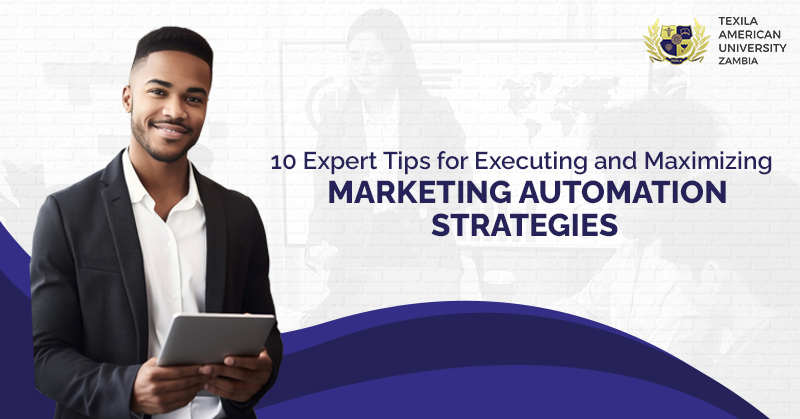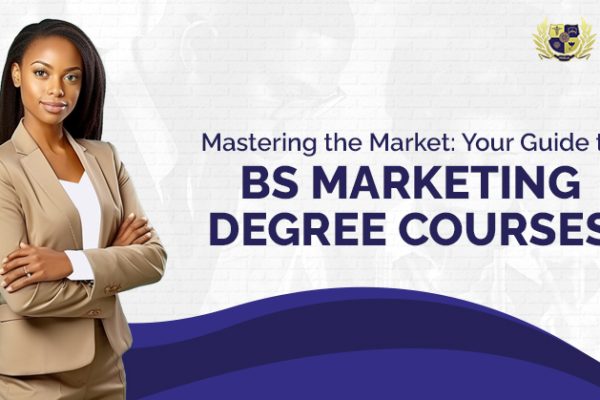|
Tired of Reading? Please listen to the blog
|
Blog Summary
Staying ahead in the fast-paced marketing world requires skills and a strategic approach. Marketing automation has emerged as a game-changer, streamlining processes and boosting efficiency. For those aspiring to excel in this dynamic field, acquiring a solid education in marketing becomes crucial. Let us delve into marketing degrees and how they seamlessly align with the execution of powerful marketing automation strategies.
Introduction
In the digital age, marketing is more than just promoting products; it is about creating experiences. Marketing automation is pivotal in automating repetitive tasks and allowing marketers to focus on creativity and strategy. This article explores the synergy between obtaining a degree in marketing and excelling in marketing automation.
Understanding Marketing Automation
Marketing automation is not just a buzzword but a transformative tool. It involves using software and technology to streamline, automate, and measure marketing tasks and workflows. From email marketing to social media management, automation enhances efficiency, enabling marketers to deliver personalized experiences at scale.
Significance of Marketing Degrees in Zambia
Like many other countries, Zambia is witnessing a surge in the demand for skilled marketing professionals. The complexities of the modern business landscape can be navigated successfully with a degree in marketing. As industries evolve, so does the need for professionals with the latest knowledge and skills.
Bachelor of Science in Marketing
The Bachelor of Science in Marketing is a comprehensive program designed to equip students with a profound understanding of marketing principles. The curriculum includes a mix of theoretical knowledge and practical applications, ensuring graduates are well-prepared for the challenges of the real world.
Tips for Executing Marketing Automation Strategies
Now, how can one leverage a marketing degree for effective marketing automation? Here are ten expert tips to seamlessly integrate education with cutting-edge automation strategies.
- Understand the Basics: Before diving into automation tools, ensure a solid grasp of marketing fundamentals. Automation complements existing strategies but does not replace them. Remember, while automation streamlines processes, a deep understanding of consumer behaviour, market segmentation, and branding fundamentals remains essential for crafting effective campaigns tailored to your audience’s needs.
- Data is Key: A marketing degree emphasizes the importance of data-driven decisions. Apply this principle to automation by leveraging data for personalized and targeted campaigns. Harnessing data allows for more precise targeting and enables dynamic content creation and real-time optimization, leading to improved customer engagement and conversion rates.
- Continuous Learning: The marketing landscape evolves rapidly. Be on top of the latest technologies and trends regarding marketing automation if you want to maximize its potential.
- Integration is Key: Integrate automation tools seamlessly into your marketing strategy. A cohesive approach ensures a unified and effective marketing ecosystem. By integrating automation with other marketing channels and tools, such as CRM systems and analytics platforms, you can achieve a holistic view of your marketing efforts, enabling better coordination and synergy across all touchpoints.
- Personalization Matters: Marketing degrees stress the significance of understanding your audience. Use automation to personalize communication, creating meaningful connections with your target audience.
- Testing and Optimization: Apply the principles of experimentation learned in your marketing courses to your automation strategy. Test, analyze, and optimize for continuous improvement. Embracing a data-driven methodology for testing and optimization empowers you to identify and refine the most effective automation workflows, messaging strategies, and campaign tactics, maximizing your ROI and driving long-term success.
- Multi-Channel Automation: A marketing degree teaches the importance of multi-channel marketing. Extend this knowledge to automation, ensuring a consistent brand presence across various platforms. Leveraging automation across multiple channels, such as email, social media, and website, allows you to maintain a consistent brand voice and messaging strategy while also reaching your audience wherever they are most active, enhancing brand visibility and engagement.
- Strategic Planning: Your education in marketing equips you with strategic thinking. Apply this skill to plan and execute automation strategies aligned with overarching business goals. By aligning your automation efforts with your broader marketing and business objectives, you can ensure that your automated campaigns are not only efficient but also effective in driving measurable results and contributing to overall organizational success.
- Customer Journey Mapping: Use your understanding of consumer behaviour to map effective customer journeys. Automation can then enhance each touchpoint along the way. By mapping out your customers’ journey from awareness to conversion and beyond, you can identify key touchpoints where automation can streamline processes, deliver timely and relevant messaging, and enhance the overall customer experience, ultimately driving greater satisfaction and loyalty.
- Analytics Proficiency: Your education in marketing includes analytics. Leverage this proficiency to measure the success of your automated campaigns and make data-backed adjustments. By leveraging analytics tools and techniques to track and analyze key metrics such as engagement, conversion rates, and ROI, you can get valuable insights into the performance of your automation efforts, detect areas for improvement, and make data-driven optimizations to drive better results and maximize ROI.
Incorporating Automation in Marketing Degree Programs
As industries adopt automation at an unprecedented pace, universities are adapting their marketing degree programs to include relevant technological advancements. Marketing students now receive an education that covers traditional marketing principles and integrates the latest automation tools and strategies.
The Synergy of Theory and Practice
The marriage of theory and practice is the hallmark of a well-rounded education. Marketing degree programs increasingly emphasize hands-on experience, ensuring students understand and apply concepts in real-world scenarios. Industry-relevant projects, internships, and collaborations with businesses provide invaluable practical insights.
Shaping Future Marketers
Education is not just about acquiring knowledge; it’s about shaping the future. Marketing degree courses play a crucial role in shaping individuals into successful marketers who can navigate the complexities of the modern business landscape. Creativity, innovation, and adaptability are nurtured, creating professionals ready to take on the challenges of the dynamic marketing field.
Conclusion
In conclusion, true innovation happens at the intersection of marketing degrees and automation. Aspiring marketers with a solid education are well-equipped to leverage automation tools strategically. The evolving landscape demands professionals who blend traditional marketing principles seamlessly with cutting-edge technologies. Get ready to embark on a journey that goes beyond textbooks and into the realm of hands-on experience. The future of marketing belongs to those who can balance theory with practice, adapt to change, and execute marketing automation strategies with finesse.











